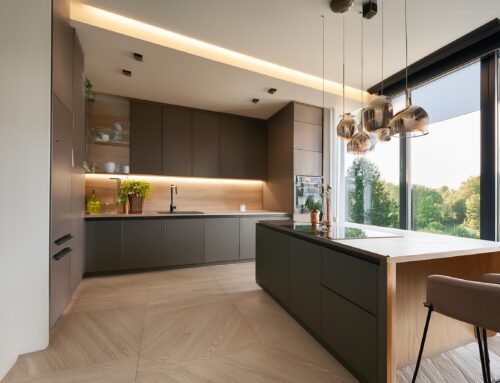Remodeling your kitchen is a big project, and it’s important to plan ahead to ensure a smooth process. One of the key components of planning your kitchen remodel is preparing and creating a checklist or timeline. In this blog post, we’ll walk you through some of the preliminary steps to consider ahead of your remodel!
For those interested in an estimate of how long their remodel will take, see our previous blog posts on How Long Kitchen Remodels Take, and How Long Remodels in Connecticut Take.
Preparation
Before you begin your kitchen remodel, there are a few things you should do to prepare. Here are some checklist items to consider:
- Determine your budget. A good point of reference to use is about 8% of the appraisal value of your home for a bathroom remodel, or 15% of the appraisal value for a kitchen remodel. For example, a reasonable sight-unseen estimate for remodeling a kitchen in a $500,000 home would be about $75,000.
- Create a wish list of features you want in your new kitchen.
- Measure your kitchen space to ensure accurate planning. Most contractors will do this for you for their initial site visit, but having measurements on-hand can be useful when requesting quotes.
- Research and gather ideas from design magazines or websites.
Picking a General Contractor
Choosing a general contractor for your kitchen remodel is an important decision. Here are some things to consider when selecting a contractor:
- Check their license and insurance.
- Look for references or reviews from previous customers. Be sure to check online communities like Facebook, Angi, Houzz, Google Reviews, and the Better Business Bureau.
- Ask for a detailed estimate or bid for the project. More detailed estimates will include breakdowns explaining material and labor costs, but may not be supplied by all contractors with their estimate.
- Discuss the timeline and project milestones with the contractor.
Designs
Designing your new kitchen is an exciting part of the remodel process. Here are some things to consider when designing your new kitchen:
- Think about the flow and layout of the space.
- Consider hiring an Interior Designer, or purchasing an Interior Design Package.
- Choose materials and finishes that fit your style and budget. Most interior designers will help with your selection process, some will even accompany you on shopping trips to their retailers and outlets.
- Select appliances that meet your needs and preferences.
- Work with your contractor to finalize the design and create a 3D rendering, floorplan, or blueprint. Most design packages include these by default, but some companies charge extra for each rendering or floorplan.
Permits
Depending on the scope of your kitchen remodel, you may need permits from your local government. Here’s what you should do:
- Check with your local government to determine if permits are required. If using a general contractor, ensure that they pull the permits correctly on your behalf.
- Submit the necessary paperwork and pay any fees.
- Wait for approval before beginning construction.
Materials
Selecting materials for your kitchen remodel can be overwhelming. Here are some things to consider when choosing materials:
- Choose materials that fit your style, budget, and durability needs.
- For more information on Kitchen Countertop Materials, check our guide!
- Order materials in advance to ensure they are available when needed. Unexpected delays on materials arrive are one of the most common complications in remodels, and the wait for materials can cause your installation to fall off schedule.
- Work with your contractor to determine delivery dates and logistics.
Installation
Once you have all of your materials, it’s time to begin the installation process. Here’s what to expect:
- Demolition and removal of old materials. This part of the process can be the most daunting for homeowners, as many complications can occur once walls and floors are opened, and plumbing and electrical are exposed. Ensuring your contractor is licensed, vetted, and insured is extremely important to avoid the need for change orders or additional work orders following demolition.
- Installation of new cabinets, countertops, and appliances.
- Electrical and plumbing work. The timeline for this work can change very suddenly when unexpected complications are found, particularly when changing the floorplan of a kitchen or bathroom, or installing appliances that exceed the previous electrical allowances.
- Flooring installation. It’s important to touch base with your contractor about floor removal, existing subfloors, and the condition of floor joists. Knowing the condition of the supports underneath the floor can be impossible until the flooring is removed, and damage the subfloors and support structure would need to be repaired before reinstalling the floor. Ensure your contractor is ready to deal with any unexpected findings when approaching larger reflooring jobs.
Finishing Touches, Punchlists, and Warranties.
Following the end of installation, it is important to make sure your contractor runs over the final quality of the installed appliances, fixtures, and surfaces.
- Complete a Punch-List: A punchlist is a list of any remaining items that need to be finished or corrected before the project can be considered complete. This may include small details such as touch-up paint or fixing a crooked cabinet or trim. While your contractor’s attention to detail is a large factor in how thorough their punchlist is, this is also a good time to bring up any issues you have with the finished state of your remodel.
- Discuss your warranty: Most contractors and remodelers offer a limited or lifetime warranty on your remodel, covering damage during and after installation. Having a written description of the terms of your warranty can be vital if any complications occur long after the install.
Conclusion
Creating a timeline for your kitchen remodel is an essential part of the planning process. By following the steps outlined in this blog post, you can ensure a successful and stress-free kitchen remodel project. Don’t forget to work closely with your contractor and communicate your needs and expectations throughout the process. Good luck!





